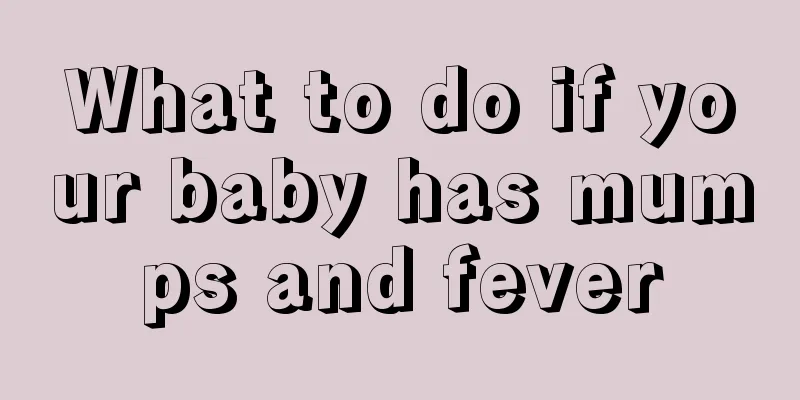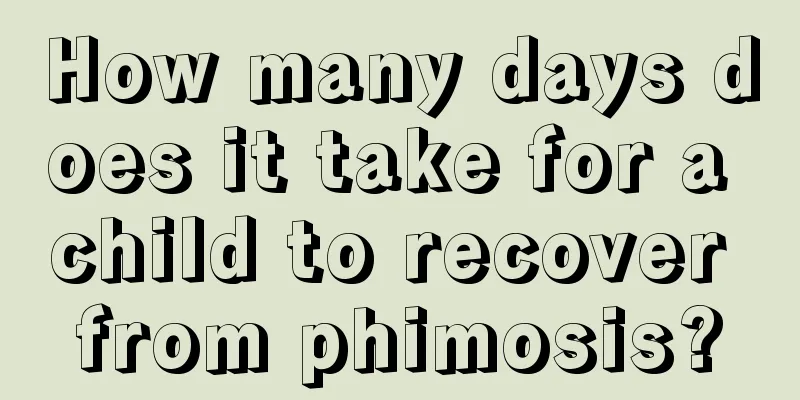What to do if your baby has mumps and fever

|
Don’t think that mumps is just an inflammation caused by a viral infection in the parotid area. In fact, mumps is an inflammation with a viral reaction throughout the body. Moreover, the chance of mumps occurring in babies is much higher than that in adults because babies’ immunity is inherently weaker. Moreover, mumps can be transmitted through saliva flying into other human bodies, so mumps patients should try to avoid contact with others. What should I do if my baby has a fever caused by mumps? Mumps is an acute systemic viral infectious disease. It is caused by the mumps virus invading the parotid gland. The patient is the source of infection, inhalation of droplets is the main route of transmission, and the disease occurs 2 to 3 weeks after contact with the patient. It usually causes enlargement and pain of the salivary glands, most commonly the parotid glands. When a baby gets mumps, the main symptom is swelling under one or both earlobes. The swollen parotid gland is often hemispherical, with unclear edges centered on the earlobe, and the face looks like a fat person with a swollen face. Because the parotid glands are located on both sides of the cheeks near the earlobes, the swollen parotid glands during mumps spread around the earlobes, so mumps is commonly known as "big mouth". The surface of mumps is hot and painful, and local pain is felt when opening the mouth or chewing. Parotid gland swelling is most obvious 1 to 3 days after onset, then gradually subsides, and the swelling completely disappears in about 2 weeks. In the first 3 to 5 days of the disease, there may be systemic symptoms such as fever, fatigue, and unwillingness to eat. Mumps is caused by bacterial infection, mainly staphylococci. The common causes are decreased secretory function of the parotid gland, which is more common in patients with acute infectious diseases and debilitated patients; obstruction of the parotid duct opening; and inflammation of the tissues adjacent to the parotid gland. Symptoms include fever, leukocytosis, local redness, swelling, pain and heat in the parotid gland. When the lesion enters the purulent stage, pus can be seen flowing out of the duct opening when the parotid gland is squeezed. In the early stages of acute suppurative mumps, the main treatment is medication, antibiotics, and the traditional Chinese medicines Jingfang Baidu Powder and Wuwei Xiaodu Yin; at the same time, methods to stimulate secretion are used to keep saliva secretion unobstructed. If the disease lasts for more than 1 week and enters the suppurative stage, an incision and drainage surgery should be performed. The viral type is usually called mumps, which occurs more often in children or teenagers with a history of infectious contact. It can be bilateral or unilaterally affected. The white blood cell count not only does not increase but decreases or is normal. The local symptoms are similar to those of the purulent type, but there is no tendency to suppuration. There is no specific treatment for viral mumps. It can be treated with the aforementioned Chinese medicine. If there is a concurrent bacterial infection, antibiotics can be used. Early symptoms: Parotid gland swelling, usually centered on the earlobe, extending forward, backward, and downward, in a pear-shaped shape with unclear edges; the local skin is tense, shiny but not red, tough and elastic to the touch, and painful to the touch; there are fever, chills, headache, sore throat, poor appetite, nausea, vomiting, body aches, etc. Late symptoms: One side swells first for 2-3 days, and then the other side also swells, accompanied by pain and heat. The pain worsens when opening the mouth and chewing. The swelling and pain subsided after about a week. When the parotid gland is swollen, most people have a fever for 3-5 days. When the parotid gland is swollen, strict isolation is necessary. Isolation can only be lifted 3 days after the parotid swelling disappears completely. Mumps is a lifelong immune disease and a person usually only gets it once in his or her lifetime. However, clinically, some patients have had mumps 2 or more times. This is because most mumps are caused by mumps viruses, such as influenza virus, parainfluenza virus, herpes virus, etc. Therefore, patients who suffer from mumps more than twice are infected with different viruses and have different symptoms. During the mumps epidemic, parents must take preventive measures. Since the disease occurs when the mumps virus invades the oral and nasal mucosa through the patient's saliva droplets and reproduces, and then forms viremia after entering the bloodstream, during the epidemic period, do not take your baby to public places with a large population, such as cinemas, markets, etc. Children must not come into contact with sick children, and windows in the room should be opened for ventilation at all times. You can also let your baby take some Isatis root powder first, or take 50 grams each of Isatis indigotica and Isatis root boiled in water orally. Let your baby rest in bed. If the body temperature is over 37.5℃, you can give your baby aspirin as appropriate, eat some soft and delicious liquid or semi-liquid food, and avoid sour and spicy foods. Drink more boiled water and keep your mouth clean. You can also rinse your mouth with compound borax solution. The swollen area can be applied with Chinese medicine, take 15 grams of Indigo, or 15 grams of the Chinese patent medicine Ruyi Jinhuangsan, and mix it with water. External application can reduce local pain and help reduce swelling. However, it should be noted that if mumps is accompanied by high fever, headache, lack of energy, sleepiness, nausea, vomiting, or upper abdominal pain, swollen testicles and other symptoms, it is very likely that encephalitis, pancreatitis and orchitis are complicated, then you should go to the hospital in time and give appropriate treatment. For example, some influenza viruses, Coxsackie viruses, herpes simplex viruses, cytomegaloviruses, etc. can cause parotid swelling, and different viral infections can cause recurrent mumps. Superficially, the symptoms are similar and may include fever, swollen and painful parotid glands, and are usually accompanied by clinical symptoms of related diseases other than mumps. Blood draws or throat swabs are required for etiological tests to determine the cause. It often recurs, and each attack usually affects the parotid gland on the same side. When the swollen parotid gland is squeezed, pus can be seen flowing out of the parotid duct opening in the mouth. Purulent parotitis caused by bacterial infection can occur in children of all ages and will disappear naturally during puberty. The reason why recurrent mumps recurs repeatedly is generally due to its inducing factors. Colds and reduced immunity are common causes. Therefore, the first thing parents should do is to prevent their babies from catching colds, pay attention to regular indoor ventilation, pay attention to hygiene and wash hands frequently, and add or remove clothes in time according to weather changes. The second thing is to pay attention to diet. You need to eat a light diet, avoid dry, hard and irritating foods, and encourage drinking more water and maintaining oral hygiene. Finally, take your baby to exercise more to strengthen their physical fitness, but avoid excessive exercise and fatigue. In addition, some people with mumps related to allergies should avoid eating foods that may induce allergies, such as mangoes, pineapples, seafood, etc. |
<<: What are the dangers of night terrors in children?
>>: Is mumps serious in children?
Recommend
27-month-old baby development indicators
We all know that many babies are in unhealthy con...
How to supplement zinc deficiency in children?
How to supplement zinc deficiency in children is ...
What department should I go to for children's colds?
If your child has a cold, it is best to go to the...
What is the reason for the purple middle of the baby's lower lip?
Babies are delicate and need constant attention f...
Can a one-year-old baby eat fried dough sticks?
In our country, most people love to eat fried dou...
What causes heel pain in children?
Heel pain in children is a common disease. Many p...
What to pay attention to when a two-month-old baby sneezes
Many babies are not well adapted to the external ...
Is it normal for a baby to poop 3 times a day?
For parents, their children's health is the g...
How to deal with a baby having a fever and convulsions
We all know that convulsions are a disease, but s...
What is the reason for a child to have a fever for a week?
Generally, children's fever will get better w...
A two-year-old child cannot walk
If a two-year-old child still cannot walk, parent...
Why do children cough when they have a fever?
Compared with adults, children have relatively po...
What is happening when my eight-month-old baby has nose bleeding?
Parents are always very nervous about their child...
What are the early symptoms of hypothyroidism in infants?
Babies' physical fitness is not like that of ...
What is the cause of blood in the child's stool?
Children are the treasures of their parents. Duri...









